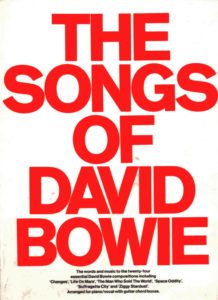David Bowie: the 100 most inspiring musicians of all time
British singer, songwriter, and actor David Bowie (born David Robert Jones, b. Jan. 8, 1947, London, Eng.) was most prominent in the 1970s and best known for his distinctive voice, shifting personae, and prescient sense of musical trends.

To call Bowie a transitional figure in rock history is less a judgment than a job description. Every niche he ever found was on a cusp, and he was at home nowhere else—certainly not in the unmoneyed London suburb where his childhood was as reserved as his adult life would be glamorous.
Gifted as a musician, actor, writer, and artist (Bowie attended art school from the age of 12), he would ultimately find his place as a performer utilizing all these skills. Nothing if not an eclectic musician in his own right, Bowie had similarly diverse tastes regarding the work of others, being an admirer of the showmanship of British actor and musician Anthony Newley as well as the romantic lyricism of Belgian musician Jacques Brel.
During the mod era of the 1960s, Bowie fronted various bands from whose shadow he—having renamed himself to avoid confusion with the singer of the Monkees—emerged as a solo singer-songwriter. “Space Oddity,” the science fiction single that marks the real beginning of his career, reached the Top Ten in Britain in 1969, the song’s welltimed
release coming just after the Apollo 11 Moon mission.
David Bowie’s third album, The Man Who Sold the World (1970),
displayed an unprecedented hybrid of folk, art rock, and heavy metal sounds. But it wasn’t until Hunky Dory (1971) that Bowie became truly popular, the hit single “Changes” being the prime vector of that fame.
The singer’s ever-changing appearance, too, created a record-selling buzz. At once lighthearted and portentous, Bowie’s dramatic chameleonlike approach was tailor-made for the 1970s, his signature decade. Bowie created a series of inspired, daringly grandiose pastiches that insisted on
utopia by depicting its alternative as inferno, beginning with the emblematic rock-star martyr fantasy The Rise and Fall of Ziggy Stardust and the Spiders from Mars (1972).
In the process he stayed so hard on the heels of the zeitgeist that the doom saying of Diamond Dogs (1974) and the disco romanticism of
Young Americans (1975) were released less than a year apart. Bowie’s public disclosure of his bisexuality, rather than derailing his growing popularity, boosted his enigmatic allure.

Similarly, his later recantation of such sexual proclivities had no negative effect on his career. Yet all this public display of personal matters took a private toll. By 1977 Bowie had decamped, ditching his idiosyncratic version of the mainstream for the avant-garde austerities of the minimalist album Low, a collaboration in Berlin with Brian Eno, the influential musician and producer who is perhaps best known for his ambient albums.
As music, Low and its sequels, Heroes (1977) and Lodger (1979), would prove to be Bowie’s most influential and lasting, serving as a blueprint for a later generation of techno-rock. In the short run, the albums marked the end of his significant mass audience impact, though not his sales.
In addition to Eno, Bowie also collaborated with guitarists Mick Ronson and Carlos Alomar as well as ace nouveaufunk producer Nile Rodgers for “Let’s Dance” (1983).
In the 1980s, despite the impressive artistic resolve of Scary Monsters (1980) and the equally impressive commercial success of Let’s Dance (1983), which produced three American Top 20 hits, Bowie’s once-innovative work seemed to have lost the musical, intellectual, and boundary-pushing edge of his previous efforts. In tandem with an acting career that, since his arresting debut in Nicolas Roeg’s The Man Who
Fell to Earth (1976), largely failed to jell, his vague later albums oscillated between would-be commercial moves for which he did not seem to have the heart (Never Let Me Down [1987]) and would-be artistic statements for which he had lost his shrewdness (Outside [1995]).
Yet his 1970s work including, in addition to his own output, service as a producer on landmark albums from Mott the Hoople, Lou Reed, and Iggy and the Stooges remains a vital and compelling index to a time it did its part to shape. Bowie was inducted into the Rock and Roll Hall of Fame in 1996. Ten years later, he was awarded the Grammy Lifetime Achievement Award.
Greatest Hits David Bowie 2017 David Bowie Best Songs.
Tracklist:
0:00 – 01. Space Oddity 5:24 – 02. Let’s Dance 9:41 – 03. Heroes 13:09 – 04. Life On Mars 18:01 – 05. Starman 22:32 – 06. Changes 26:35 – 07. Ashes To Ashes 31:59 – 08. Rebel Rebel 36:40 – 09. Ziggy Stardust 40:35 – 10. Modern Love 45:34 – 11. Golden Years 49:12 – 12. Under Pressure 53:42 – 13. Jean Genie 58:02 – 14. Suffragette City
1:01:37 – 15. Young Americans 1:07:04 – 16. China Girl 1:11:33 – 17. The Man Who Sold The World 1:16:03 – 18. Cat People 1:20:25 – 19. Fashion 1:24:08 – 20. Moonage Daydream 1:29:02 – 21. Five Years 1:33:35 – 22. Dancing in the Street 1:37:05 – 23. Rock ‘n’ Roll Suicide 1:40:14 – 24. Queen Bitch 1:43:37 – 25. Where Are We Now? 1:47:58 – 26. Blue Jean
